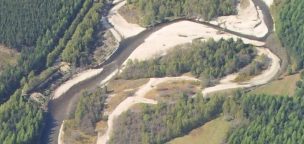Category: Research
Supervisors: Dr Mark Naylor, Prof Hugh Sinclair, Dr Stella Pytharouli, Calum Cuthill Summary You will improve and test our prototype arduino based low-cost seismic logger which is designed for meduim-term deployments, with telemetry, in harsh environments such as debris flow sites. Project background Seismology can be used to monitor the initiation and evolution of various […]
This poster was presented at the 2021 Southern California Earthquake Center (SCEC) meeting. It demonstrates the development of time-independent earthquake forecasts with inlabru, building on our work on spatial models, and how well these perform in pseudo-prospective testing with the pyCSEP package. You can also view this poster and others from the meeting here. This […]
By PhD Student Bronwyn Matthews (Sounding Out the River) In September 2020, I started my PhD amidst a global pandemic of which I had no idea about when I applied in January 2020. I found the PhD opening for a project entitled ‘Sounding out the river: Seismic monitoring of bedload mobilisation and transport in mountain […]
In the Sounding Out the River project, we had dual aims of showing (i) how to monitor bedload transport during floods using geophones and also (ii) the development of a low cost data collection and telemetry system. This latter component has seen us develop three pieces of technology. BattMan (for battery management) Geoduino Seismic Logger […]
I recently re-discovered some simulations I did during my PhD and am as intrigued by them now as I was then – so I thought I would share them with you. For my PhD I wrote a Discrete Element Model to simulate the evolution of mountain building. This treats the subsurface as a course granular […]
Forward: Sediment production on Earth is dominated by the erosion of active mountain ranges. It seems intuitive that maximum sediment flux delivered to surrounding continental margins should correlate with active mountain building (orogenesis). Therefore, active orogenic systems where important interactions occurs between tectonics, climate and surfaces processes like Andes or Taiwan have been the place […]
Forward: One of the big challenges with forecasting natural hazards is how to combine the disparate range of data-types that could inform a forecast. With seismicity, this includes the point location of past events, line maps of the location of known active faults, and raster maps of the rate at which the crust is straining […]
Blog Author: Francesco Serafini (2nd year PhD Student, H2020 funded) What a year to start a PhD! If two years ago someone told me that I would have found myself writing a blog post about my first year as PhD student in Geosciences at the University of Edinburgh during a global pandemic I wouldn’t believe […]
Edinburgh is leading a £20M GCRF Hub in Urban Risk Transition in Tomorrow’s Cities with a focus on Kathmandu, Istanbul, Quito, and Nairobi. This week, we held a webinar on some of the seismic hazard work being undertaken in Kathmandu. I will post a link to the full webinar when it is available, but you […]
Project Summary: You will develop and utilise a seismic monitoring system to monitor the mobilisation and transport of bedload in mountain rivers to understand impacts on flood hazard and fluvial erosion rates. A full description of the project can be found on the E4 website. Project Background: Rivers that drain mountain catchments carry a bedload […]



Recent comments